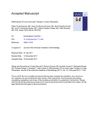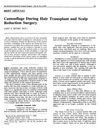 19 citations,
September 2004 in “Reviews in gynaecological practice”
19 citations,
September 2004 in “Reviews in gynaecological practice” Effective hirsutism management requires identifying the cause, combining new and traditional treatments, and setting realistic expectations for patients.
 March 2024 in “Journal of Rawalpindi Medical College/Journal Rawalpindi Medical College”
March 2024 in “Journal of Rawalpindi Medical College/Journal Rawalpindi Medical College” Skin issues are common and important for diagnosing PCOS.
 September 2002 in “Dermatologic Surgery”
September 2002 in “Dermatologic Surgery” The recipient site can affect the growth and survival of transplanted hair but not its thickness.
 51 citations,
January 2003 in “Hormone Research in Paediatrics”
51 citations,
January 2003 in “Hormone Research in Paediatrics” Hormones and their receptors, especially androgens, play a key role in hair growth and disorders like baldness.
 12 citations,
July 1979 in “International Journal of Dermatology”
12 citations,
July 1979 in “International Journal of Dermatology” A patient with zinc depletion improved after zinc supplementation during parenteral nutrition.

Penicillamine can cause taste problems due to copper loss, which can be fixed with copper or zinc supplements.
 48 citations,
January 2012 in “The journal of investigative dermatology/Journal of investigative dermatology”
48 citations,
January 2012 in “The journal of investigative dermatology/Journal of investigative dermatology” Chemokine signaling is important for hair development.
 26 citations,
March 2014 in “Journal of cutaneous medicine and surgery”
26 citations,
March 2014 in “Journal of cutaneous medicine and surgery” Topical vitamin D is useful for some skin conditions but not effective for others, and more research is needed.
 January 2023 in “Vìsnik problem bìologìï ì medicini”
January 2023 in “Vìsnik problem bìologìï ì medicini” Androgenic alopecia causes hair follicle degradation and skin restructuring, but some hair elements remain.
 16 citations,
December 2017 in “Journal of The American Academy of Dermatology”
16 citations,
December 2017 in “Journal of The American Academy of Dermatology” Low-level laser therapy may reduce symptoms and increase hair thickness in lichen planopilaris patients.
 36 citations,
November 1961 in “Archives of Dermatology”
36 citations,
November 1961 in “Archives of Dermatology” The document suggests that the traditional understanding of hair growth cycles and alopecia may be inaccurate and that blood supply plays a significant role in hair growth and loss.
 160 citations,
January 2014 in “Seminars in cell & developmental biology”
160 citations,
January 2014 in “Seminars in cell & developmental biology” Early development of hair, teeth, and glands involves specific signaling pathways and cellular interactions.
April 2024 in “Surgical Techniques Development” The 11th AICPE Congress in Rimini was a major event in European aesthetic plastic surgery.
 2 citations,
June 1997 in “The American Journal of Cosmetic Surgery”
2 citations,
June 1997 in “The American Journal of Cosmetic Surgery” Scalp camouflage is important for patients to feel confident after hair surgery and can also help those with early hair loss.
 1 citations,
July 2020 in “bioRxiv (Cold Spring Harbor Laboratory)”
1 citations,
July 2020 in “bioRxiv (Cold Spring Harbor Laboratory)” Removing centrosomes from skin cells leads to thinner skin and stops hair growth, but does not greatly affect skin cell differentiation.
38 citations,
May 2017 in “Medical Science Monitor” Myositis in lupus patients is linked to skin rash, hair loss, blood issues, and high disease activity.
33 citations,
July 2007 in “Journal of cell science” Miz1 is essential for proper hair structure and growth.
 19 citations,
November 1993 in “Mammalian Genome”
19 citations,
November 1993 in “Mammalian Genome” A gene mutation in mice causes permanent hair loss and skin issues.
96 citations,
March 2007 in “Developmental biology” The study found that the protein Dkk4 helps regulate hair growth by controlling Wnt signaling in mice.
December 2023 in “Animals” The study mapped yak skin cells to understand hair growth better.
8 citations,
January 2016 in “Cells tissues organs” Norepinephrine helps skin cells grow, which is important for hair growth.
November 2021 in “Frontiers in medicine” A patient with both bullous lichen planus and systemic lupus erythematosus showed improvement with treatment.
 9 citations,
October 2008 in “Mutation research”
9 citations,
October 2008 in “Mutation research” N-acetyl-L-cysteine (NAC) can prevent DNA damage and protect cells from harm.
 6 citations,
December 2016 in “Springer eBooks”
6 citations,
December 2016 in “Springer eBooks” Environmental stressors like UV radiation, pollution, and extreme temperatures can damage skin and lead to diseases and aging.
 November 2011 in “APMIS. Acta pathologica, microbiologica et immunologica Scandinavica./APMIS”
November 2011 in “APMIS. Acta pathologica, microbiologica et immunologica Scandinavica./APMIS” Polyomavirus A2 infection in newborn mice caused hair follicle tumors.
 13 citations,
September 2012 in “Critical Reviews in Food Science and Nutrition”
13 citations,
September 2012 in “Critical Reviews in Food Science and Nutrition” Wheat straw is valuable for its health benefits and various industrial uses.
 July 2024 in “Skin Research and Technology”
July 2024 in “Skin Research and Technology” The products significantly promote hair growth and maintain hair bulb health.
July 2024 in “Anais Brasileiros de Dermatologia” PRP injections can increase hair density in people with androgenic alopecia.
 5 citations,
April 2019 in “Dermatologic therapy”
5 citations,
April 2019 in “Dermatologic therapy” Secukinumab for psoriasis unexpectedly caused increased hair growth in a patient.
 2 citations,
March 2020 in “Skin”
2 citations,
March 2020 in “Skin” Using cidofovir cream for a rare skin disease can cause skin darkening.






















